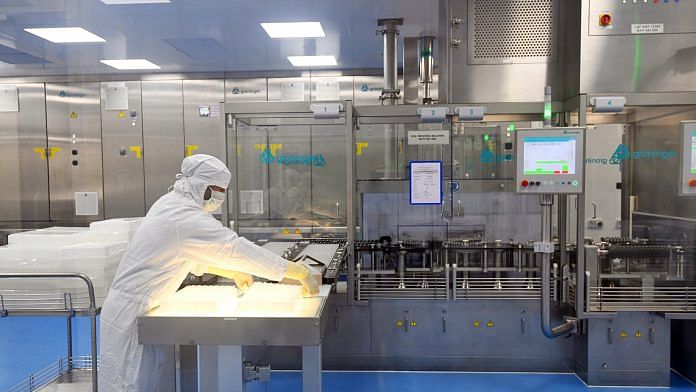The Serum Institute of India Ltd., which is producing the coronavirus vaccine developed by AstraZeneca Plc and the University of Oxford, expects the Indian government to sign a formal supply and pricing agreement within days after the shot was approved for emergency usage.
Officials in New Delhi have “indicated orally” that the first 100 million vaccines will be purchased and priced at Rs 200 ($2.74) and a deal should be inked “in the next one or two days,” Serum’s Chief Executive Officer Adar Poonawalla said in an interview on Sunday. “They will probably take another 200 million after that and then we will probably end up selling to the private market,” which might be approved in “two or three months” at Rs 1,000 a vaccine, he said.
The Drugs Controller General of India, V.G. Somani, at a briefing earlier on Sunday confirmed the restricted approval of the Astra-Oxford shot. The move came just days after the U.K. regulator gave clearance to the vaccine and is the first step to inoculate about 1.3 billion citizens in the country that’s home to the world’s second-largest Covid-19 outbreak.
“They just want to make sure they have enough products for their most vulnerable and most needy to begin with,” Poonawalla said. “We are waiting for two things: how much quantity they want and where they want it. Once they give us that direction within 7 to 10 days we’ve committed we’ll roll it out.”
Serum, which is the world’s largest vaccine maker by volume, has an agreement with AstraZeneca to produce at least a billion doses. The company has already made 70 million, Poonawalla said, adding that an initial production target of 100 million by December had to be scaled back due to a lag in approvals.
“I’ve actually stopped production because of the regulatory delays and uncertainty, not knowing how much to pack,” he said. “You assign a shelf life on the production when you decide to pack it and I don’t have anywhere to store it — we are building new warehousing, which is still going to take another year and a half, even though we started in March constructing it.”
Poonawalla also expects to start supplying the vaccine to Covax, the World Health Organization-backed body that’s purchasing shots for poor nations, by early March. Serum would likely send an initial 20 million doses before scaling to about 50 million within a month, he said.
India’s regulator also gave restricted approval to Covaxin from Bharat Biotech International Ltd. — which has been partly financed by India’s government and has yet to complete vital phase three trials. Somani said Covaxin was given the nod so India, which has 10.3 million confirmed infections, had more vaccination options in case mutant strains emerge.
Efficacy, faith
Bharat Biotech said last month it had already produced about 10 million doses ahead of an anticipated roll out by the middle of 2021. The firm says its inactivated vaccine candidate that uses a dead version of the virus has efficacy rates of at least 60%, though it has yet to release data publicly and is awaiting a peer review in an international health journal.
While the move to give limited approval for Bharat Biotech’s vaccine was hailed as a “giant leap for innovation and novel product development in India” by the company’s Joint Managing Director Krishna Ella in a statement on Sunday, the regulatory nod has faced criticism.
“Approval was premature and could be dangerous,” Shashi Tharoor, a prominent opposition lawmaker, said on Twitter. “Its use should be avoided till full trials are over. India can start with the AstraZeneca vaccine in the meantime.”
Poonawalla declined to comment on the approval of Bharat Biotech’s Covaxin, but said only the vaccines from AstraZeneca, Moderna Inc. and Pfizer Inc. had “efficacy and proof — anything else is faith,” he said. “Let time tell if it works and then we can comment how good or bad they are.”
Pfizer is also still awaiting Indian approval of its vaccine. Its need for ultra-cold storage make it an unlikely candidate for widespread use across India. Both Bharat and Serum’s vaccines can be stored at refrigerator temperature, making them more suited to the country’s patchy health infrastructure. -Bloomberg
Also read: Everything we know about Covishield, one of 2 Covid vaccines likely to get nod for use in India



